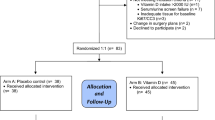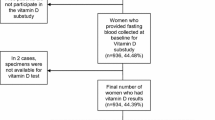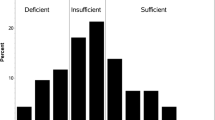Abstract
Low serum vitamin D levels have been associated with poor outcomes in women diagnosed with early breast cancer. However, no randomized controlled trials (RCTs) have been performed to determine whether vitamin D supplementation might be an effective intervention in this population. We prospectively evaluated vitamin D adequacy and supplementation rates in a contemporary cross-sectional sample of breast cancer patients from 2 large urban centers and examined the feasibility of an RCT of vitamin D supplementation. Women with recently diagnosed early breast cancer were prospectively identified and recruited in Toronto and Los Angeles between March 2009 and January 2010. Anthropometric measurements, dietary, lifestyle, and medication histories were obtained by means of structured questionnaires and interviews. Tumor and treatment characteristics were abstracted from clinical records and blood samples were collected for analysis of 25-OH vitamin D. 173 eligible patients (median age 57) were enrolled. Clinical and treatment characteristics were similar between centres. 84.4 % of women reported use of vitamin D-containing supplements with median daily doses of 1,400 IU. Median 25-OH vitamin D levels were 85.5 and 98.5 nmol/L (P = 0.1), and levels of deficiency (<50 nmol/L), insufficiency (50–72 nmol/L), and adequacy (>72 nmol/L) were 3.8, 23.8, 72.5 % (Toronto) and 4.3, 20.7, 75 % (Los Angeles). 25-OH vitamin D levels were strongly correlated with vitamin D supplement use (r = 0.41, P < 0.0001). 68 % of women expressed willingness to participate in a vitamin D supplementation RCT; however, only 12.7 % of the study population met the pre-specified feasibility criteria (25-OH vitamin D <72 nmol/L, willing to participate, and taking ≤1,000 IU vitamin D supplement/day). Both vitamin D levels and supplementation rates are higher than in previous reports. While the majority of women would be willing to participate in an RCT of vitamin D supplementation, low levels of deficiency/insufficiency and high rates of supplement use would limit the feasibility of such a study.


Similar content being viewed by others
References
Goodwin PJ (2009) Vitamin D in cancer patients: above all, do no harm. J Clin Oncol 27:2117–2119. doi:10.1200/JCO.2008.20.8629
Institute of Medicine (2011) Dietary reference intakes for calcium and vitamin D. National Academies Press, Washington DC
Chlebowski RT (2011) Vitamin D and breast cancer: interpreting current evidence. Breast Cancer Res 13:217. doi:10.1186/bcr2846
Lappe JM, Travers-Gustafson D, Davies KM, Recker RR, Heaney RP (2007) Vitamin D and calcium supplementation reduces cancer risk: results of a randomized trial. Am J Clin Nutr 85:1586–1591
Anderson LN, Cotterchio M, Vieth R, Knight JA (2010) Vitamin D and calcium intakes and breast cancer risk in pre- and postmenopausal women. Am J Clin Nutr 91:1699–1707. doi:10.3945/ajcn.2009.28869
http://www.cancer.ca/Canada-wide/Prevention/Vitamin%20D/UV%20%20Vitamin%20D%20and%20Health%20Conference.aspx. Accessed 12 Sep 2011
http://www.dermatology.ca/media/position_statement/vitamin_d.html. Accessed 2 Oct 2011
Goodwin PJ, Ennis M, Pritchard KI, Koo J, Hood N (2009) Prognostic effects of 25-hydroxyvitamin D levels in early breast cancer. J Clin Oncol 27:3757–3763. doi:10.1200/JCO.2008.20.0725
Kim HJ, Lee YM, Ko BS et al (2011) Vitamin D deficiency is correlated with poor outcomes in patients with luminal-type breast cancer. Ann Surg Oncol 18:1830–1836. doi:10.1245/s10434-010-1465-6
Vrieling A, Hein R, Abbas S et al (2011) Serum 25-hydroxyvitamin D and postmenopausal breast cancer survival: a prospective patient cohort study. Breast Cancer Res 13:R74. doi:10.1186/bcr2920
Jacobs ET, Thomson CA, Flatt SW et al (2011) Vitamin D and breast cancer recurrence in the Women’s Healthy Eating and Living (WHEL) Study. Am J Clin Nutr 93:108–117. doi:10.3945/ajcn.2010.30009
Ahn J, Peters U, Albanes D et al (2008) Serum vitamin D concentration and prostate cancer risk: a nested case-control study. J Natl Cancer Inst 100:796–804. doi:10.1093/jnci/djn152
Stolzenberg-Solomon RZ, Jacobs EJ, Arslan AA et al (2010) Circulating 25-hydroxyvitamin D and risk of pancreatic cancer: Cohort Consortium Vitamin D Pooling Project of Rarer Cancers. Am J Epidemiol 172:81–93. doi:10.1093/aje/kwq120
Stambolsky P, Tabach Y, Fontemaggi G et al (2010) Modulation of the vitamin D3 response by cancer-associated mutant p53. Cancer Cell 17:273–285. doi:10.1016/j.ccr.2009.11.025
Petitjean A, Mathe E, Kato S et al (2007) Impact of mutant p53 functional properties on TP53 mutation patterns and tumor phenotype: lessons from recent developments in the IARC TP53 database. Hum Mutat 28:622–629. doi:10.1002/humu.20495
Lippman SM, Klein EA, Goodman PJ et al (2009) Effect of selenium and vitamin E on risk of prostate cancer and other cancers: the Selenium and Vitamin E Cancer Prevention Trial (SELECT). JAMA 301:39–51. doi:10.1001/jama.2008.864
Knight JA, Lesosky M, Barnett H, Raboud JM, Vieth R (2007) Vitamin D and reduced risk of breast cancer: a population-based case-control study. Cancer Epidemiol Biomarkers Prev 16:422–429. doi:10.1158/1055-9965.EPI-06-0865
Sahota H, Barnett H, Lesosky M et al (2008) Association of vitamin D related information from a telephone interview with 25-hydroxyvitamin D. Cancer Epidemiol Biomarkers Prev 17:232–238. doi:10.1158/1055-9965.EPI-07-0632
Block G, Hartman AM, Dresser CM et al (1986) A data-based approach to diet questionnaire design and testing. Am J Epidemiol 124:453–469
Holick MF (2007) Vitamin D deficiency. N Engl J Med 357:266–281. doi:10.1056/NEJMra070553
Statistics Canada (2010) Canadian Health Measures Survey: Cycle 1 2007 to 2009. 82-623-X, no. 2
Hadji P, Aapro MS, Body JJ et al (2011) Management of aromatase inhibitor-associated bone loss in postmenopausal women with breast cancer: practical guidance for prevention and treatment. Ann Oncol. doi:10.1093/annonc/mdr017
Chlebowski RT, Johnson KC, Kooperberg C et al (2008) Calcium plus vitamin D supplementation and the risk of breast cancer. J Natl Cancer Inst 100:1581–1591. doi:10.1093/jnci/djn360
Peppone LJ, Huston AJ, Reid ME et al (2011) The effect of various vitamin D supplementation regimens in breast cancer patients. Breast Cancer Res Treat 127:171–177. doi:10.1007/s10549-011-1415-4
Yao S, Sucheston LE, Millen AE et al (2011) Pretreatment serum concentrations of 25-hydroxyvitamin D and breast cancer prognostic characteristics: a case-control and a case-series study. PLoS One 6:e17251. doi:10.1371/journal.pone.0017251
Khan QJ, Reddy PS, Kimler BF et al (2010) Effect of vitamin D supplementation on serum 25-hydroxy vitamin D levels, joint pain, and fatigue in women starting adjuvant letrozole treatment for breast cancer. Breast Cancer Res Treat 119:111–118. doi:10.1007/s10549-009-0495-x
Acknowledgments
This work was funded by the Breast Cancer Research Foundation. David Cescon is supported by a CAMO-CIHR Fellowship.
Conflict of interest
None.
Ethical standards
This study complies with the current laws of the countries in which they were performed.
Author information
Authors and Affiliations
Corresponding author
Electronic supplementary material
Below is the link to the electronic supplementary material.
Rights and permissions
About this article
Cite this article
Cescon, D.W., Ganz, P.A., Beddows, S. et al. Feasibility of a randomized controlled trial of vitamin D vs. placebo in women with recently diagnosed breast cancer. Breast Cancer Res Treat 134, 759–767 (2012). https://doi.org/10.1007/s10549-012-2120-7
Received:
Accepted:
Published:
Issue Date:
DOI: https://doi.org/10.1007/s10549-012-2120-7




